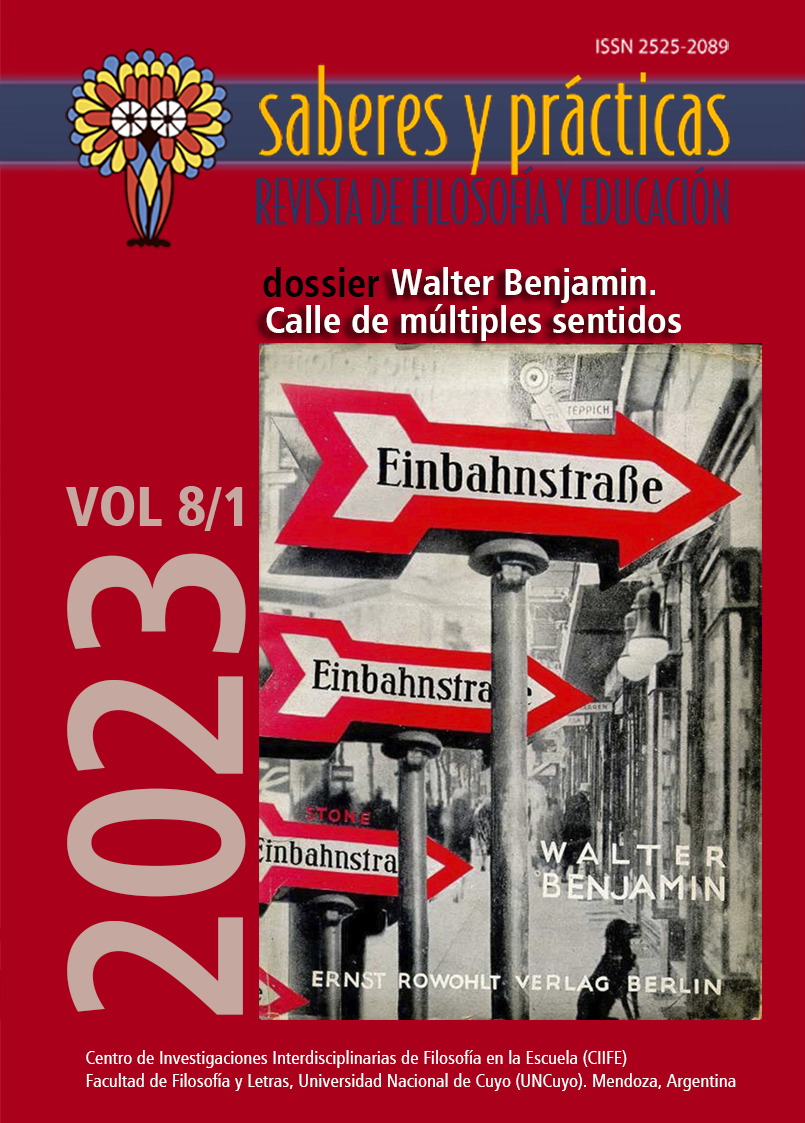Teachers´ Educators’ Identity: The Significant Other in Intimate Times and Spaces Key
DOI:
https://doi.org/10.48162/rev.36.088Keywords:
teachers' professional identity, (auto) biographical narrative inquiry, identity anchors, teachers' educators, significant othersAbstract
Based in auto (biographical) narrative inquiry, this article aims at recovering the way in which teachers, mentors, colleagues and students influence the configuration of teachers´ educators’ professional identity. The narratives of twenty-seven teachers participating in a doctoral investigation carried out within the GIEEC (Educational and Cultural Studies Research Group) in Humanities School at UNMDP and related to a doctoral program in Humanities and Art offered by UNR, were framed in the idea of anchors of identity deployed by Rom Harré. The narratives recover the intimacy of spaces and people which shaped their professional choices and practices. The teachers, in charge of the pedagogical courses for the teachers’ education programs at Facultad de Humanidades in UNMDP, told their stories and practices during in depth interviews and focus groups. Some of the findings show that, beyond disciplinary education, the affections exercised by teachers along their educational paths, daily interaction with colleagues and with students that inhabit their classrooms are weaved in a complex fabric with body, name, self-conscience, memory and discursive positioning which are the anchors of identity, theoretical framework of this study.
Downloads
References
Aguirre, J.; Porta, L. y Ramallo, F. (2022). Tramas cronotópicas y devenires auto-biográficos en la formación doctoral. La performatividad del posgrado desde las narrativas de docentes universitarios. Saberes y prácticas. Revista de Filosofía y Educación 7, (2) 1-19. Disponible https://revistas.uncu.edu.ar/ojs/index.php/saberesypracticas/article/view/6576
Bolívar, A. (2002). ¿De nobis ipsis silemus?: Epistemología de la investigación biográfico-narrativa en educación. Revista Electrónica de Investigación Educativa 4(1). Disponible https://www.scielo.org.mx/scielo.php?script=sci_arttext&pid=S1607-40412002000100003
Bolívar Boitía, A., Domingo Segovia, J. y Fernández Cruz, M. (2001). La Investigación biográfico-narrativa en educación: enfoque y metodología. Muralla
Bourdieu, P. (2007). El sentido práctico. Siglo XXI
Britzman, D. (2013) Between Psychoanalysis and Pedagogy: Scenes of Rapprochement and Alienation. Curriculum Inquiry 43 (1) 95-117. Disponible https://www.tandfonline.com/doi/abs/10.1111/curi.12007?journalCode=rcui20
Bruner, J. S. (2003). La fábrica de historias: derecho, literatura, vida. Fondo de Cultura Económica
Bruner, J. (2004). Life as Narrative. Social Research 71(3), 691–710. Disponible https://www.jstor.org/stable/40970444
Clandinin, D. J. (Ed.). (2006). Composing diverse identities: narrative inquiries into the interwoven lives of children and teachers. Routledge.
Clandinin, D. J., y Connelly, F. M. (1996). Teachers' professional knowledge landscapes: Teacher stories––stories of teachers––school stories––stories of schools. Educational researcher, 25 (3), 24-30. Disponible https://www.jstor.org/stable/1176665
Connelly, F. M. y Clandinin, D. J. (1990). Stories of Experience and Narrative Inquiry. Educational Research, 19 (5), 2–14. Disponible https://journals.sagepub.com/doi/10.3102/0013189X019005002
Davies, B. y Harré, R. (1999) Posicionamiento la producción discursiva de la identidad. Sociologica 14 (39) 215-239. Disponible https://atheneadigital.net/article/view/n12-davies-harre/0
Delory Momberger, C. (2009). Biografía y educación Figuras del individuo-proyecto. CLACSO. Disponible http://biblioteca.clacso.edu.ar/clacso/coediciones/20171122033344/Biografia_educacion.pdf
Denzin, N. K. y Lincoln, Y. S. (2005). Introduction: The Discipline and Practice of Qualitative Research. En Denzin, N. K., y Lincoln, Y. S. (Eds.). The Sage Handbook of Qualitative Research. Third Edition. Vol. I, pp. 1–33. SAGE Publications.
Glandore, R. (1990) Prefacio a la edición inglesa. En Bruner, J. S. La educación, puerta de la cultura. Madrid: Visor
Guba, E., y Lincoln, Y. S. (2012). Controversias Paradigmáticas, contradicciones y confluencias emergentes. En Denzin, N. K., y Lincoln, Y. S. Manual de Investigación Cualitativa (Vol. II, pp. 38–78). Gedisa
Hall, S. (2003). Introducción: ¿quién necesita “identidad”? En Hall, S. y Du Gay, P. (comp.) Cuestiones de identidad social. Amorrortu Editores. 13 – 39.
Harré, R. (1984). Personal being: a theory for individual psychology. Harvard University Press.
Mendizábal, N. (2006). Los componentes del diseño flexible en la investigación cualitativa. En Vasilachis de Gialdino, I. (Ed.). Estrategias de Investigación Cualitativa, pp. 65–107. Gedisa.
Morin, E. (2000). Por una nueva reforma del pensamiento. Magistralis, (18), 61–71. Disponible https://repositorio.iberopuebla.mx/bitstream/handle/20.500.11777/495/Magistralis18-Morin.pdf?sequence=1&isAllowed=y
Peñuelas, S. A. P. (2020). Los otros significativos en la construcción del sí mismo. Utopía y praxis latinoamericana: revista internacional de filosofía iberoamericana y teoría social, (4), 152-161. Disponible https://produccioncientificaluz.org/index.php/utopia/article/view/32934/34509
Porta, L. (2010). La investigación biográfico narrativa en educación. Entrevista a Antonio Bolívar. Revista de Educación, 1(1), 201–212. Disponible https://fh.mdp.edu.ar/revistas/index.php/r_educ/article/view/14
Sennett, R. (2012). Juntos. Anagrama
Sverdlick, I (2012) La investigación educativa como instrumento de acción, de formación y de cambio. En Sverdlick, I. (comp.) La investigación educativa: una herramienta de conocimiento y de acción. Noveduc
Revilla, J. C. (2003). Los anclajes de la identidad personal. Athenea Digital, (4), 1–14. Disponible https://atheneadigital.net/article/view/n4-revilla
Van Lagenhove, L. y Harré, R. (2016). Posicionamiento y autobiografía: el relato de vida. Revista de Educación 7 (9), 77–96. Disponible https://fh.mdp.edu.ar/revistas/index.php/r_educ/article/view/1900
Vasilachis de Giardino, I. (2006). La Investigación Cualitativa. En Vasilachis de Gialdino, I. (Ed.) Estrategias de Investigación Cualitativa, pp. 23–60. Gedisa
Yuni, J. y Urbano, C. (2005) Mapas y Herramientas para Conocer la Escuela. Investigación etnográfica e investigación acción. Editorial Brujas.
Published
How to Cite
Issue
Section
License
Copyright (c) 2023 Claudia De Laurentis
This work is licensed under a Creative Commons Attribution-NonCommercial-ShareAlike 2.5 Argentina License.





















